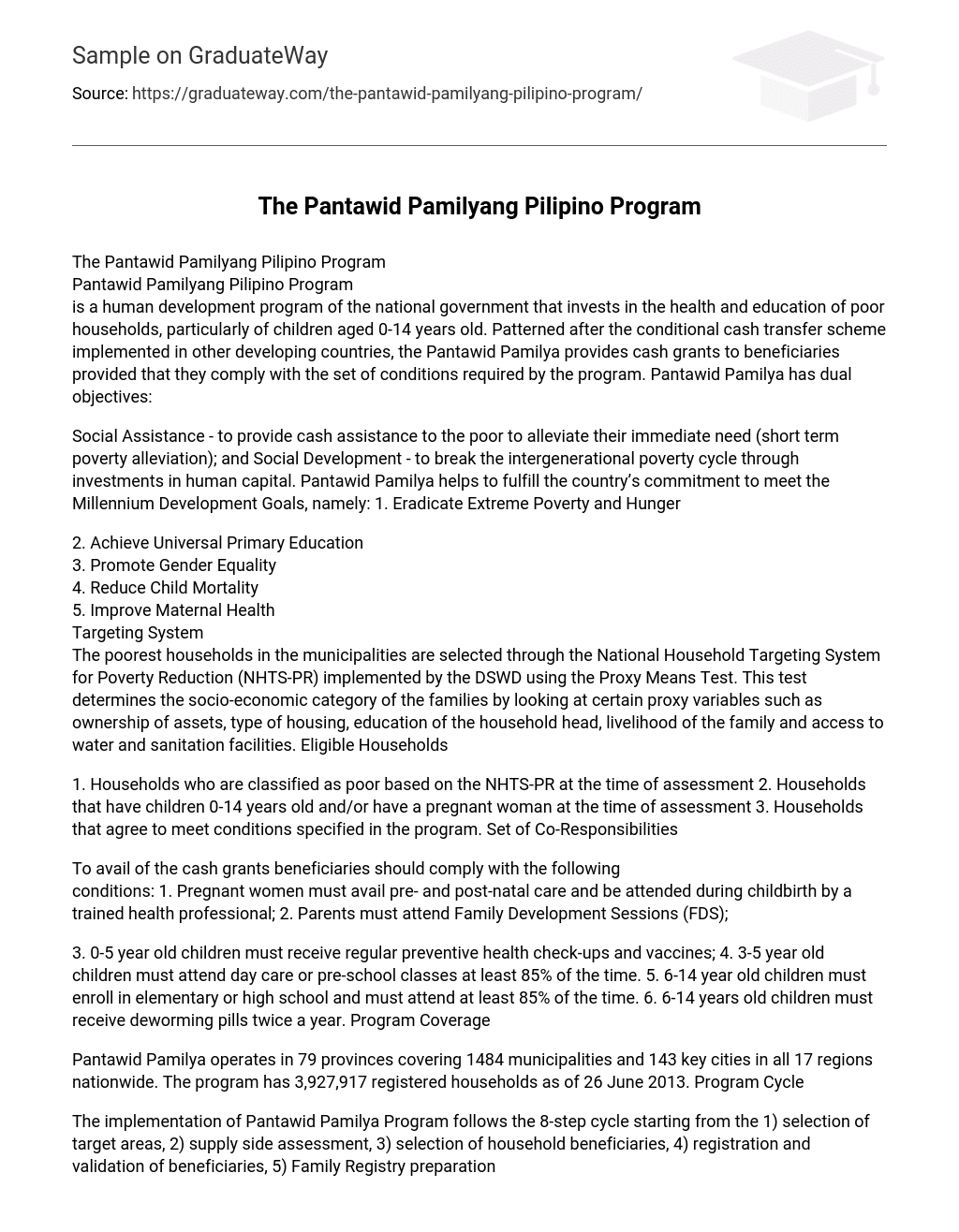The Pantawid Pamilyang Pilipino Program is a government initiative aimed at improving the health and education of impoverished households, specifically focusing on children aged 0-14 years old. It follows a conditional cash transfer model similar to other developing nations, granting cash assistance to beneficiaries who meet the program’s requirements. The Pantawid Pamilya Program strives to achieve two primary objectives.
- Social Assistance – to provide cash assistance to the poor to alleviate their immediate need (short term poverty alleviation)
- Social Development – to break the intergenerational poverty cycle through investments in human capital.
Pantawid Pamilya contributes to the achievement of the Millennium Development Goals, specifically:
- Eradicate Extreme Poverty and Hunger
- Achieve Universal Primary Education
- Promote Gender Equality
- Reduce Child Mortality
- Improve Maternal Health
The DSWD uses the National Household Targeting System for Poverty Reduction (NHTS-PR) to select the poorest households in the municipalities. The NHTS-PR uses the Proxy Means Test to determine the socio-economic category of families. This test looks at certain proxy variables, including ownership of assets, type of housing, education of the household head, livelihood of the family, and access to water and sanitation facilities.
Eligible Households
- Households who are classified as poor based on the NHTS-PR at the time of assessment
- Households that have children 0-14 years old and/or have a pregnant woman at the time of assessment
- Households that agree to meet conditions specified in the program. Set of Co-Responsibilities
Beneficiaries must meet the following conditions in order to access the cash grants:
- Pregnant women must avail pre- and post-natal care and be attended during childbirth by a trained health professional;
- Parents must attend Family Development Sessions (FDS);
- 0-5 year old children must receive regular preventive health check-ups and vaccines;
- 3-5 year old children must attend day care or pre-school classes at least 85% of the time.
- 6-14 year old children must enroll in elementary or high school and must attend at least 85% of the time.
- 6-14 years old children must receive deworming pills twice a year.
Pantawid Pamilya is present in 79 provinces, encompassing 1484 municipalities and 143 key cities across all 17 regions in the country. As of June 26, 2013, the program has a total of 3,927,917 registered households.
The implementation of the Pantawid Pamilya Program adheres to the 8-step cycle, which begins with:
- selection of target areas,
- supply side assessment,
- selection of household beneficiaries,
- registration and validation of beneficiaries,
- Family Registry preparation,
- initial payment,
- verification of compliance
- 2nd and succeeding release of cash grants.
Pantawid Pamilya offers cash grants to beneficiaries. These grants include an annual amount of P6,000 or a monthly sum of P500 for health and nutrition expenses per household. Moreover, educational expenses are covered with a grant of P3,000 per child for one school year or 10 months, which is equivalent to P300 per month. This assistance is only available for households with up to three children. If a household has three eligible children, they will receive a monthly subsidy of P1,400 during the school year or an annual amount of P15,000 if they meet the necessary requirements. The distribution process involves providing cash grants through a Land Bank cash card and is typically given to either the mother or the most responsible person in the household.
If cash card payment is not possible, beneficiaries will receive their cash grants through alternative methods. This includes over-the-counter transactions at the nearest Landbank branch or offsite payments through Landbank. Cash grants are also distributed through other rural banks, Globe Remit, Philpost, First Consolidated Bank, and other Cooperative Financial Institutions (CFI), particularly in remote areas.





